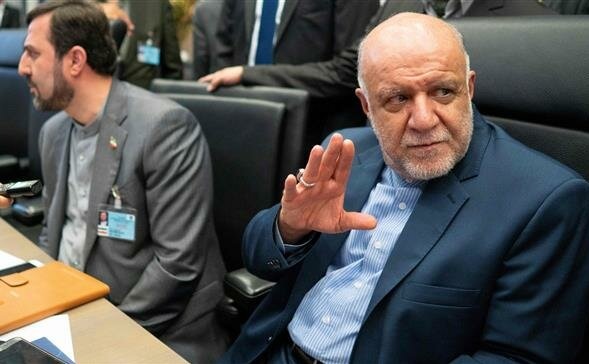Iranian Oil Minister Bijan Namdar Zanganeh at a meeting of the Organization of the Petroleum Exporting Countries, Vienna, Austria, July 1, 2019
A top Iranian official has implicitly acknowledged the effect of the Trump Administration’s “maximum pressure” on Tehran, declaring Iran’s oil exports could be increased in three days — but only if US sanctions are eased.
Oil Minister Bijan Zanganeh said on Tuesday, “In case sanctions on Iran’s oil exports are lifted, we would restore oil production to pre-sanction level in three days.”
The Trump Administration is seeking to reduce Iran’s exports to zero, after withdrawing from the 2015 nuclear deal in May 2018 and imposing comprehensive sanctions from November. The sanctions were tightened this spring, with an end to waivers for Iran’s top customers, including China, India, South Korea, Japan, and Turkey.
Tanker and shipping industry sources estimate that Iran’s official exports were between 100,000 and 400,000 barrels per day in July, down from 2.5 million bpd in April 2018. Analysts have said that Iran may be moving up to another 400,000 bpd on grey and black markets, turning off the GPS transponders of tankers.
Oil production has also been affected, as Iran’s storage facilities — both on-shore and on ships off-shore — are full.
French President Emmanuel Macron has been trying to mediate between Tehran and Washington, seeking the salvation of the 2015 agreement between Iran and the 5+1 Powers (US, UK, France, Germany, China, and Russia). He has spoken several times with Iranian President Hassan Rouhani and arranged for a surprise visit by Foreign Minister Mohammad Javad Zarif last weekend.
But Iran drew a firm line with Macron on Monday, saying it will not discuss the Iranian missile program.
In February, the European Union launched a mechanism, INSTEX, to bypass US sanctions with non-dollar trade in Iranian oil and other commodities and goods. But Tehran’s leadership refused the arrangement because of “humiliating conditions”: the EU’s concern over missiles, Iran’s activities in the Middle East, and alleged involvement in bomb and assassination plots in Europe.
Macron has offered a $15 billion line of credit An Iranian official said Tehran will consider reversing its suspension of commitments under the nuclear deal if the line is established — but went no further over new discussions on missiles and Iran’s military and political activities.
Since June, Iran has broken the 2015 deal’s limit on stocks of 3.67% uranium, raised enrichment to 4.5%, and said it will consider returning to the pre-2015 production of 20% uranium, which potentially can be further enriched to 90% grade for a military nuclear program.


In farsi…
https://www.radiofarda.com/a/30133171.html
The former mayor of tehran who shot his wife several times was set free after wife’s brother who is a irgc forgave him. Take that the west who don’t know what justice is.
“Oil Minister Bijan Zanganeh said on Tuesday, “In case sanctions on Iran’s oil exports are lifted, we would restore oil production to pre-sanction level in three days.””
His intellect is wasted as oil minister, he could have been Einstein.